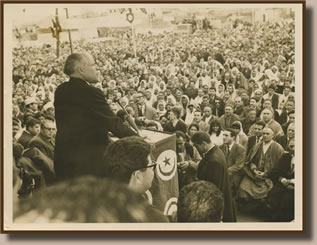LOOKING FOR BOURGUIBA IN CAIRO
Every nation has in its history a man or a woman who has had a major effect on the country and was able to change its destiny appreciably. Some leave the worst of memories, and the examples are abundant even today, and some leave an outstanding legacy, which would have not happened had it not been for such an individual.
Tunisia was blessed, first by having been the centre from which shone the father of social geography in the fourteenth century, the Andalusian Abdel-Rahman Ibn Khaldun; then
by being the birthplace of Habib Bourguiba, who led its struggle for liberation until its independence in 1956. The fact that Bourguiba was successful in rescuing Tunisia from French colonialism is understandably due to several enabling factors. Bourguiba, though, was the trigger and tenacious catalyst who was realistic enough not to attempt to hold a gun to France’s head. Rather he helped his enemy see the logic behind the factors that justified granting Tunisia its independence, and become convinced that Tunisia’s independence was in France’s interest too. Bourguiba’s main French interlocutor was Pierre Mendes-France, well known leftist Jewish politician who eventually became Prime Minister under the French Fourth Republic in 1954. Mendes-France understood Bourguiba, and was able to put himself in his shoes. The latter also put himself in the shoes of his interlocutor, and both were able to start the process of discussing the independence of Tunisia, which was finalized in 1956. Eventually France did what Bourguiba and the Tunisian people wanted to achieve all along, namely, grant the country its independence with minimum bloodshed.
The more important achievement Bourguiba eventually made post independence was to re-prioritize the important issues of interest and benefit to the Tunisian people. He proceeded to build the basic infrastructure of the country without which he could not have effected the core changes he made, and which at one time propelled Tunisia to a relatively higher qualitative and quantitative orbit than all the peoples and countries surrounding it.
The reason why Bourguiba succeeded while others failed was his concentration, first and foremost, on education at all levels. He then relegated religion to where it belongs, so that it is not used as an argument to hamper the struggle for liberation from ignorance, backwardness and isolationism. At the same time, he liberated women from customs falsely attributed to Islam, to mythologies, social obscurantism and the resulting convoluted judicial and administrative complications, whose only outcome was to stifle women and subjugate them. He also concentrated on building the industrial and agricultural infrastructure of his country. Bourguiba was thus able to offer Tunisia and the Tunisian people a distinguished and respectable position among the civilized peoples of the world.
|
Bourguiba addressing the population
in the city of Sousse
in Tunisia in 1960 |
Eltaher and Bourguiba had known of each other since the 1930s, though Eltaher’s relationship with Tunisia went back to the early 1920s when he used to write about Tunisia in Egyptian newspapers and also in Tunisian publications. The story of the relationship between the two men has been told in a number of articles and books. Bourguiba himself mentioned it several times during his public speeches after he became Prime Minister, then as President of Tunisia.
At first the two men had never met since they were both in two different countries. Eltaher was a well-known personality in Egypt and the Arab World, while Bourguiba was an unknown lawyer outside Tunisia.
Bourguiba led a separatist movement against
the Tunisian Destour Party, which was under the leadership of its historic
leader Abdelaziz El-Thaalbi, who was, before Bourguiba, the main leader of the struggle against French colonial presence in Tunisia. After Bourguiba split from the Destour Party and created the Neo-Destour Party, Eltaher stood against the rebellious faction in his newspaper for fear that the split would harm the future of the national movement in Tunisia.

